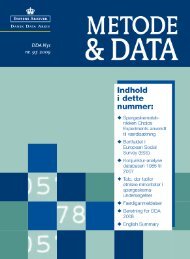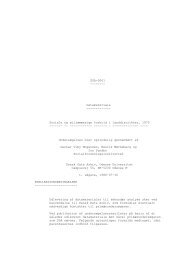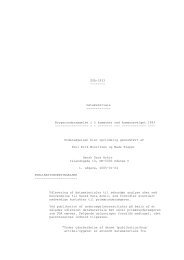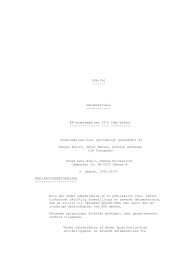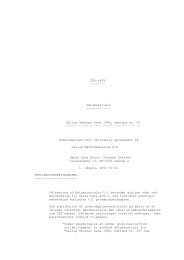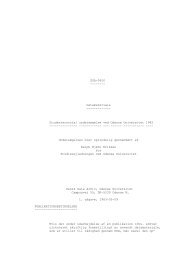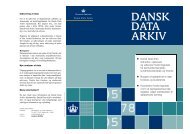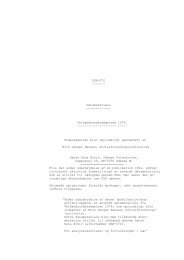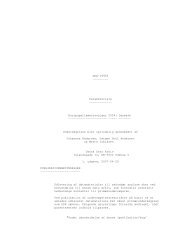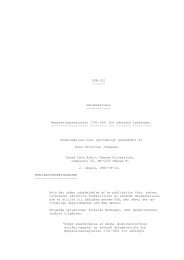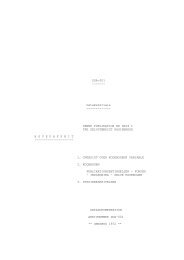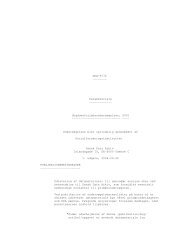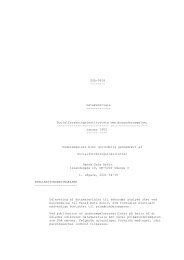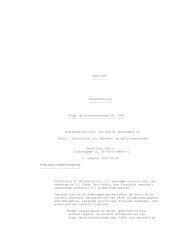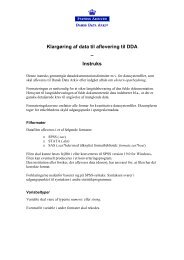Metode og Data nr. 86 - DDA Samfund - Dansk Data Arkiv
Metode og Data nr. 86 - DDA Samfund - Dansk Data Arkiv
Metode og Data nr. 86 - DDA Samfund - Dansk Data Arkiv
You also want an ePaper? Increase the reach of your titles
YUMPU automatically turns print PDFs into web optimized ePapers that Google loves.
The survey is based on extracts from<br />
DIKE’s health database with personal<br />
interviews with a representative sample of<br />
Danes aged 15 or more. The survey population<br />
consists of the national sample<br />
supplemented with representative samples<br />
from the counties of Frederiksborg and Funen.<br />
The data were collected by means of personal<br />
interviews in the period 19<strong>86</strong>-1987 by the<br />
permanent interviewing staff of the Danish<br />
National Institute of Social Research.<br />
Interviews were carried out in three rounds:<br />
September 19<strong>86</strong>, February 1987, and May/<br />
June 1987.<br />
In the first interview round the data<br />
material was obtained by means of two<br />
questionnaires: questionnaire 1 to all<br />
respondents, and questionnaire 2 to respondents<br />
in the county of Frederiksborg. In the<br />
second and third interview rounds three<br />
questionnaires were used: questionnaire 1 to<br />
all respondents, questionnaire 2 to respondents<br />
in the county of Frederiksborg, and<br />
questionnaire 3 to respondents in the county<br />
of Funen.<br />
The majority of the questions (but not all<br />
of them) are included in all three interview<br />
rounds (two rounds with special questions<br />
to the respondents in the county of Funen).<br />
In addition to questions about general<br />
background information the questionnaires<br />
included questions about, among others, the<br />
following main themes:<br />
• Health and personal well-being (including<br />
satisfaction with life, stress in daily life).<br />
• Long-term or chronic diseases (allergic<br />
diseases).<br />
• Symptoms or nuisances.<br />
• Activity reduction owing to illness.<br />
• Health behaviour, use of the health service<br />
sector and healers (degree of satisfaction<br />
with general practitioner; alternative treatment).<br />
• Reduction of physical function (use of<br />
technical aids, e.g. glasses, hearing aid or<br />
stick).<br />
• Teeth and dental care.<br />
• External health risks and resources (housing<br />
conditions, contact with/help from<br />
other people, working conditions, industrial<br />
accidents and accidents outside place of<br />
work).<br />
• Health behaviour and health habits (measures<br />
taken in order to maintain/improve<br />
one’s health, spare time activities, sleeping<br />
habits, consumption of beer, wine and<br />
alcohol, smoking habits, dietary habits).<br />
• Expenses in connection with illness (membership<br />
of the health insurance society<br />
„Danmark“).<br />
• Priority ordering of problems and challenges<br />
which the health service sector is<br />
faced with (waiting lists, preventive efforts,<br />
new types of treatment, closing down of<br />
hospitals).<br />
File dimensions: 6697 cases, 709 variables.<br />
<strong>DDA</strong>-1567 „Dietary Habits and<br />
Health of the Elderly in Roskilde,<br />
1988-1990“<br />
(Merete Osler)<br />
In recent years epidemiol<strong>og</strong>ists and other<br />
medical researchers have become increasingly<br />
interested in the effects that diet may have on<br />
health and disease, and it has been acknowledged<br />
that the health of the elderly is<br />
influenced by their living conditions and life<br />
style. During the last 30 years the proportion<br />
of old people (aged 60 or more) of the total<br />
population has increased from 15 to 20 per<br />
cent. This had led to an increased interest on<br />
the part of society in taking a number of<br />
positive actions which will help to extend<br />
the period of good health and function far into<br />
old age. However, sufficient knowledge is<br />
not available as regards the influence of<br />
various factors on the health of the elderly.<br />
Therefore a survey was initiated in 1988-89<br />
with the purpose of examining the health,<br />
living conditions and life style of old people<br />
– with special emphasis on dietary habits.<br />
The main purposes of this survey were:<br />
1. To describe the dietary habits of old people<br />
and to assess whether differences as<br />
regards health and social conditions influence<br />
the dietary habits of old people.<br />
2. To develop an exact method for the measuring<br />
of old people’s dietary habits,<br />
including an evaluation of the validity of<br />
the method.<br />
3. To examine and describe old people’s<br />
health behaviour.<br />
<strong>Metode</strong> & <strong>Data</strong> <strong>nr</strong>. <strong>86</strong> – 2002 side 54



